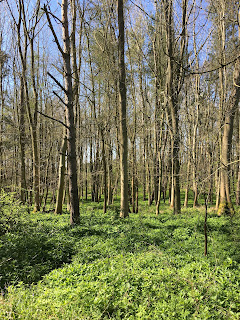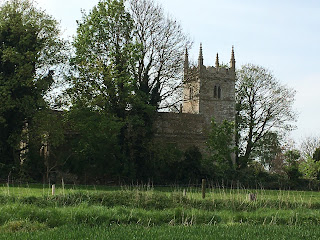INTO THE WOODS
'Into the woods
without delay, but careful not to lose the way,
Into the woods, who
knows what may be lurking on the journey.
Into the woods to get
the thing that makes it worth the journeying
Into the woods to see
the King…
…Into the woods then
out of the woods, and home before dark.’
So here I am entering the woods, or more precisely Rockingham Forest, or more precisely what’s left of it. The other day I heard a TV pundit say that what you and I think is a forest in a Henry VIII hunting sense, really isn’t. According to the expert, it was always a mix of habitats, but not all of them deep and dark, as Sondheim imagined. John Major – and doesn’t he begin to look more of a statesman year by year? - got into trouble a few decades ago with his vision of an ancient England sheltering under a canopy of trees end to end. He probably didn’t have that quite right. But there is something rather hooky about the co-existence of two nostrums concerning early Britain: 1) that there weren’t all that many people knocking about 2) that those very few people managed to cultivate huge swathes of countryside. In France forêt generally means what it says. Perhaps we should assume it did in earlier versions of England too, at least ‘once upon a time’.
Christians aren’t strangers to the dark side, more like friends of it. We confront blackness every day, most notably in ourselves. And what with Advent and Lent, the dark days of later autumn, and the whoa-things-are-going-wrong-here narrative of the Gospels, maybe we need a bit more emphasis on glory. Only this morning, I was sent an invitation to an autumn Zoom session to learn more about ‘lament’. Well, that’s nice. Something to look forward to then, when the weather worsens.
Towards
the end of the Second War there was a prisoner-of-war camp in Sulehay Woods
near Wansford, now a nature reserve. On this April day it’s beautifully
bedecked with primroses, anemones, and bluebells. According to the WW2 enthusiasts, you don’t need to hunt too hard to find relics of eighty
years ago among the bushes and trees. The prisoners were slowly
repatriated. Our version of history says
we treated them better than any other country, at least if you compare the
reported mortality of the inmates.
Only a very few died
In our care.
Mostly they left
nothing there
Among the trees.
While we made films
Of breaking in and
breaking out -
The Great Escape
Where Eagles Dare -
They went home
To effect repair
Of a ruined nation.
And having learned to
trust again
So now we bear
A common weight.
The past is buried in
this wood
And the world has
turned.
Despite divorce,
From circumstance
We have to share
For the common good.
Up ahead of me on the path I spot a man with a camera, crouching. His wife, forty metres ahead of him, is dawdling, wanting to get on with the ramble. Ignoring her, he retraces his steps towards me, and is straight in with, ‘Are you interested in fungi? Trigger-off, I reply: ‘Not particularly’. Unabashed, he continues, ‘Only I’ve just found a couple of morels’. And indeed he has, and indeed I’ve never seen morels in a setting like that before. His question is of course, one that might be susceptible of quite other interpretations in a different context. Sex or drugs or rock n'roll.
 |
| Inside Nassington church |
I’ve walked some of today’s paths before. It’s interesting what I remember and what I don’t. I’m expecting the Nene Way from Wansford to Yarwell to be wet on the margins of the water meadow, and it is, drying up as I describe a wide semicircle into Nassington. I don’t recall St Mary and All Saints Nassington at all: perhaps it was under lock and key when I visited during Covid. It’s a generously proportioned building half way up the village slope. Inside there are wall paintings to your left as you look towards the altar, a dragon slain, and as you raise your eyes towards the chancel – the full panoply of resurrected heaven with Christ at the centre. Only the reds and traces of blue remain on the figures now. It must have been a magnificent, awe-inspiring sight for medieval worshippers. It still has the capacity to thrill now.
Yarwell and Nassington have a joint village brass band, long in existence. It greeted survivors of the Crimean war when they alighted from the train in Elton, the railway having been built just a decade before. We’re not the only ones to suffer future-shock, as we can read in Mrs. Gaskell's 'Cranford'. In 2023 the journey those soldiers made resonates in a way we wouldn’t have thought possible ten years ago.
When George came home
to Yarwell
They helped him from
the train
For he’d never walk
again
He’d never walk again.
When George came home
to Yarwell
The sky was as blue and
clear
As he remembered in
Crimea
The killing fields of
Crimea
And the band played Rule Britannia
And they sang God save the Queen
And they raised a glass to Victory
And to the Boys who’d written History
Wherever it was they’d been.
When George came home
to Yarwell
He felt so bitter
cold
After the heat of
Sebastopol
That heat in
Sebastopol.
When George came home
to Yarwell
The parson intoned a
prayer
Although he’d not been
there
Though he had not been
there.
And the band played Rule Britannia etc.
When George came home
to Yarwell
He tied a rope to a
tree
So he didn't have to
see
What he did not want to
see.
And the band played Rule Britannia
And they sang God save the Queen
And they raised a glass to Victory
And to the Boys who’d written History
Wherever it was they’d been.
Charles Causley would have written this better, but it’s the best I can do.
Apethorpe – Wansford – Yarwell – Nassington – Apethorpe.
19 km. Five and a half hours. Chilly ENE wind, so I travelled clockwise. Sunny throughout, and warm out of the breeze at 15 degrees.
All content © Vince Cross 2023 except quotation from ‘Into the
Woods’ ©
Stephen Sondheim/Rilting Music/WB/Geffen
I like Sam Wells, Rector of St. Martin-in-the-Fields, but am pondering his Radio 4 ‘Thought for the Day’. He thinks a generalised prayer e.g. ‘We pray for the situation in Sudan’ is lazy, and that we should be better informed, and pray more specifically for whatever Sudan needs. I think well, maybe. Often I haven’t a clue what to ask for, even after listening diligently to The News with all its possibilities for disinformation and bias. His reply would perhaps be that I’d find out what was needed in the course of praying. But I’m wearied by the weight of information. Addict though I am, I’m suffering from La Newsée.




Comments
Post a Comment